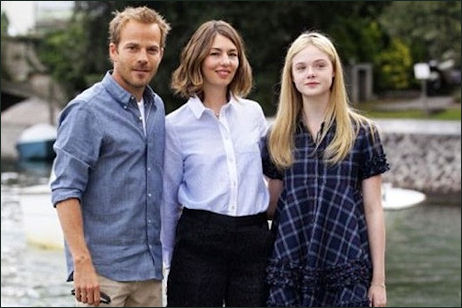I was somewhere between charmed and delighted when it hit me that Sofia Coppola‘s Somewhere (12.22) is a fairly close facsimile of an early ’60s Michelangelo Antonioni film. It’s not about imitation, but the unhurried meditative mood is striking, intriguing. For this and other reasons, I fell right into Somewhere‘s game. I think it signifies a huge breakthrough for Coppola, regardless who agrees or disagrees or how many Average Joes pay to see this Focus Features release.

Somewhere director-writer Sofia Coppola with Stephen Dorff and Elle Fanning at last September’s Venice Film Festival.
So I leapt at the chance to speak with Coppola last night, even though it meant hanging out in the apartment at 8:30 pm and having to blow off the premiere of All Good Things.
Somewhere is about a form of spiritual depletion — a kind of nothingness not unknown in wealthy movie-star realms. It’s not the same flatline syndrome that afflicted Antonioni’s characters in L’Avventura, L’Eclisse, La Notte and Blow-Up, but it’s in the same general ballpark. You can sense a subtle poisoning in the air. An affluent lethargy of some kind. A downswirl vibe. I love that Coppola refuses to spell it out or give it a name.
Nobody in Coppola’s league has had the vision or the guts to make a film like this, a film in which the main character, a rich but starting-to-fade Hollywood actor named Johnny Marco (Stephen Dorff), does very little and says even less as he drives his black sports car around and resides at West Hollywood’s Chateau Marmont and gets laid a lot and basically just…plotzes. Very little happens, but there’s a whole lotta stuff going on beneath.
Okay, something does happen. Johnny’s 11 year-old daughter (Elle Fanning) is dropped off at the hotel by her mom for whatever reason, and Johnny is asked to take care of her for a couple of weeks (or at least more than two or three days). Nobody says anything, no speeches are spoken, but bit by bit the self-absorbed Johnny begins to revel in the mood between himself and his daughter, and you can sense a kind of opening up beginning to happen. But it never goes beyond that. Nobody declares or demonstrates anything. Not overtly, I mean.
Our conversation was okay. I could hear Sofia, but not all that well, frankly. I think the mp3 recorder has trouble as well. She said something about being cool with meeting in Manhattan in a week or so. She and her two children and her musician-boyfriend Thomas Mars lived in Paris for three or four years (longer?), but they’re in New York these days. I sound like a kiss-ass at times, but that tone just slips in when I’m talking about a film I really like.
